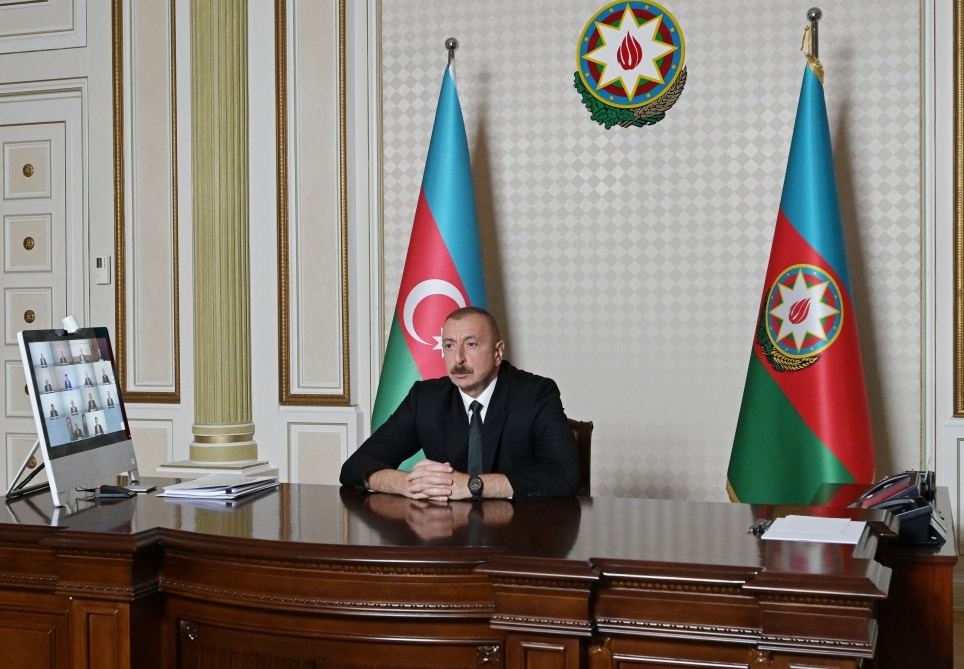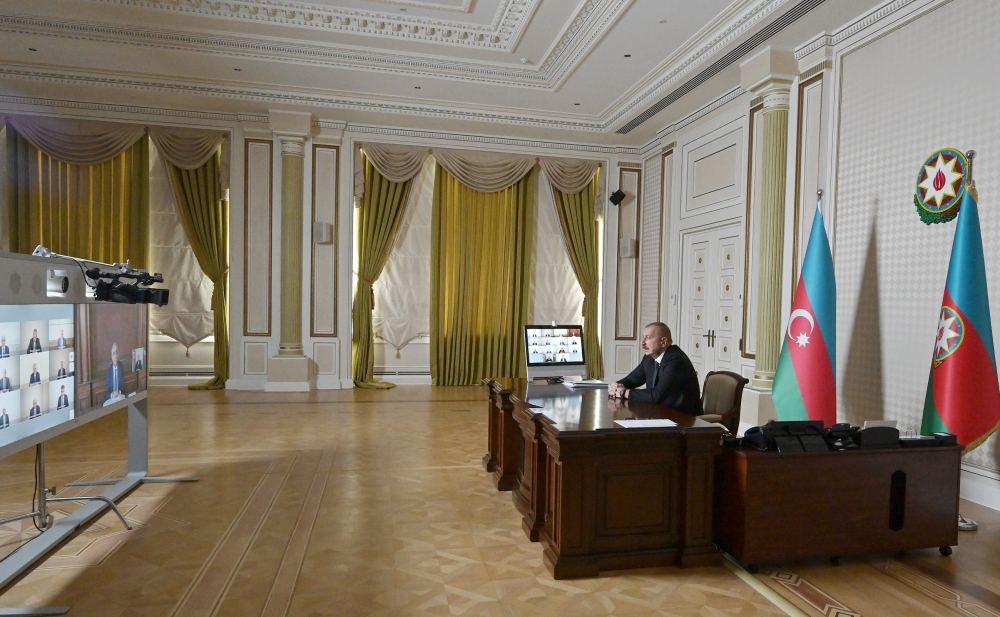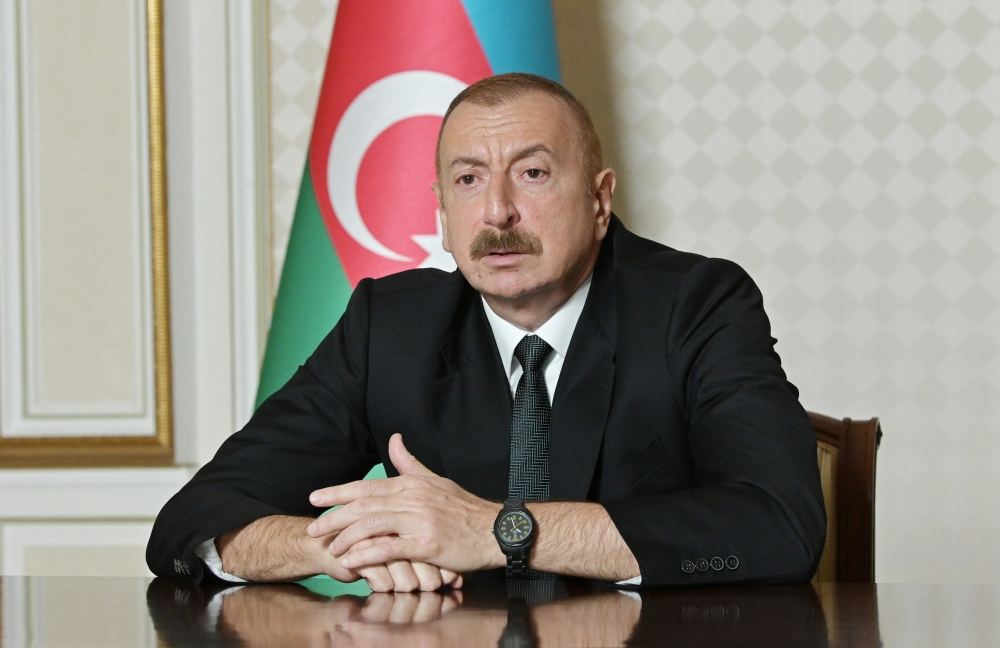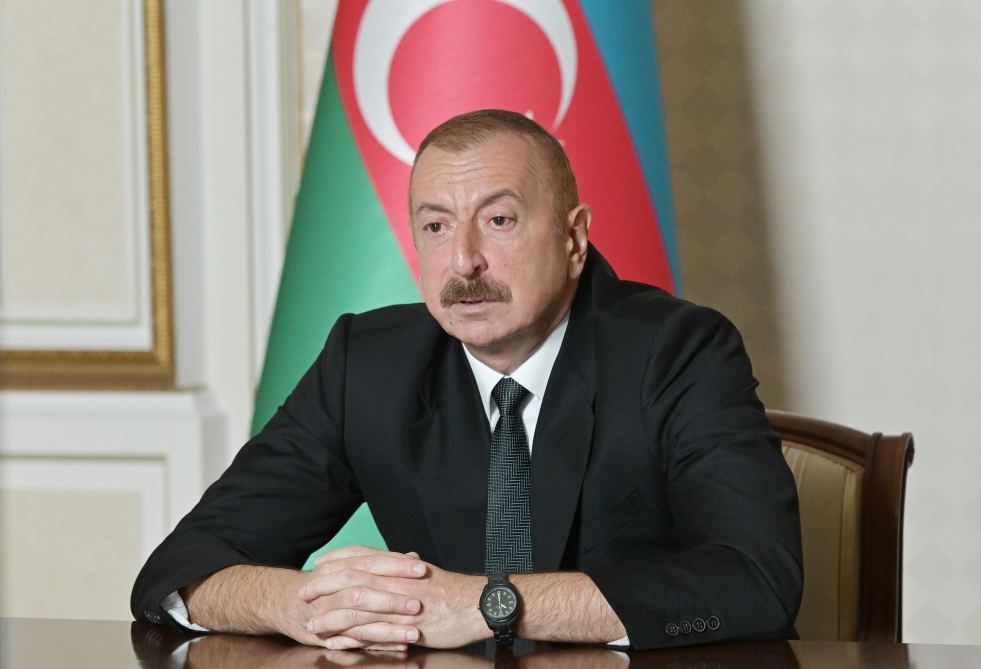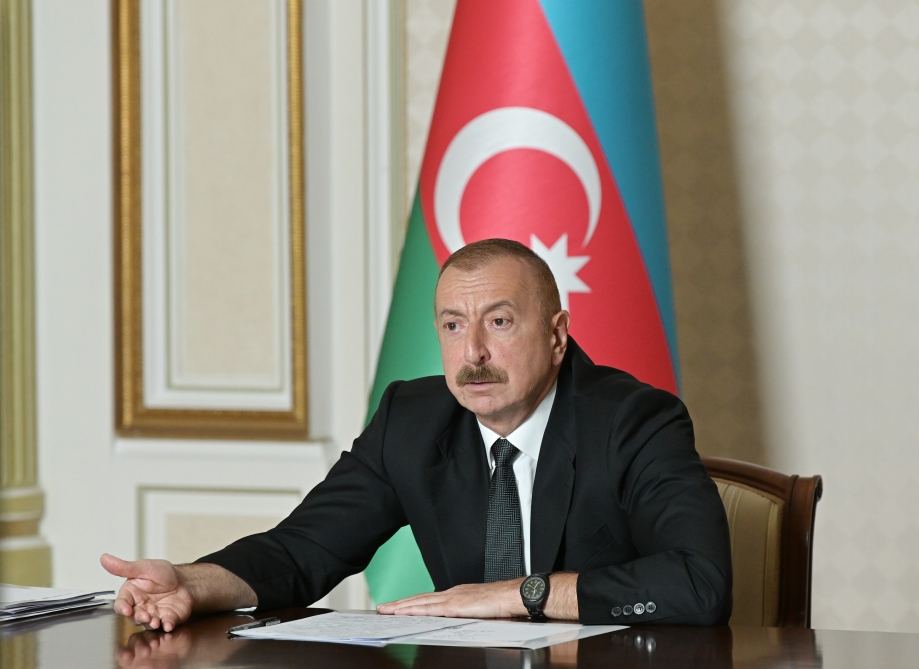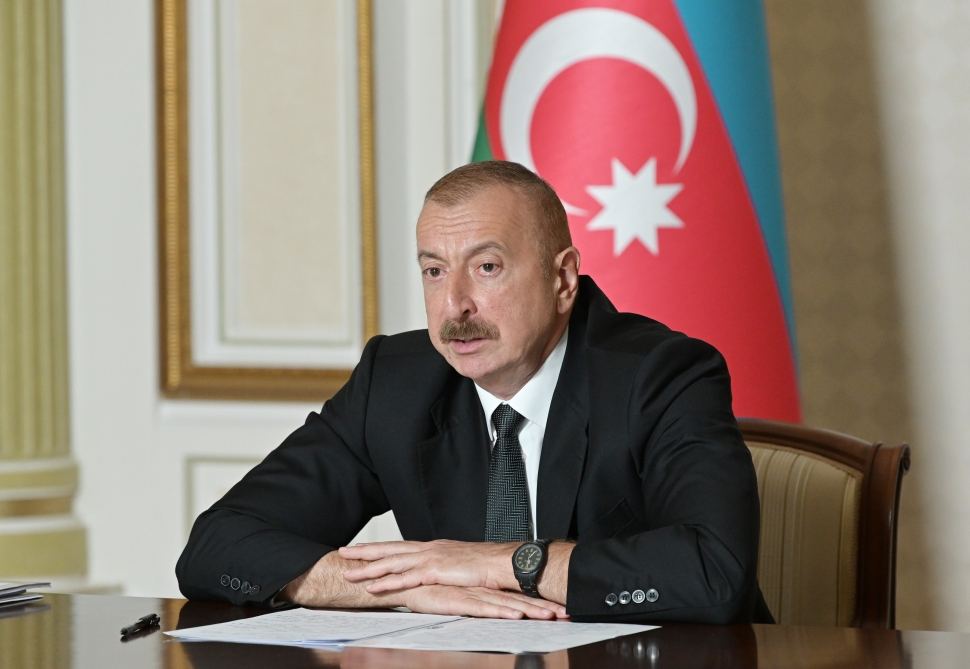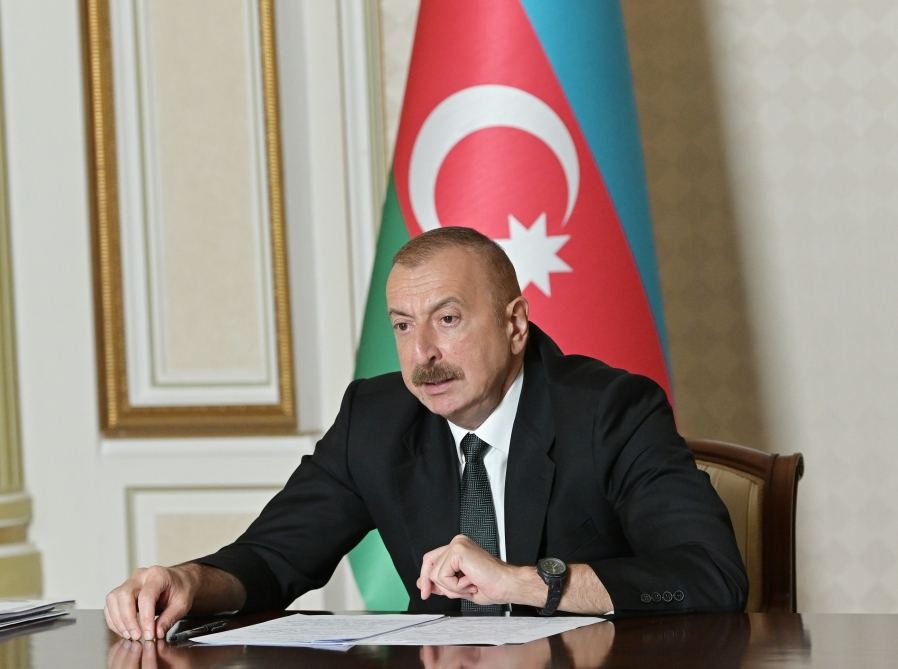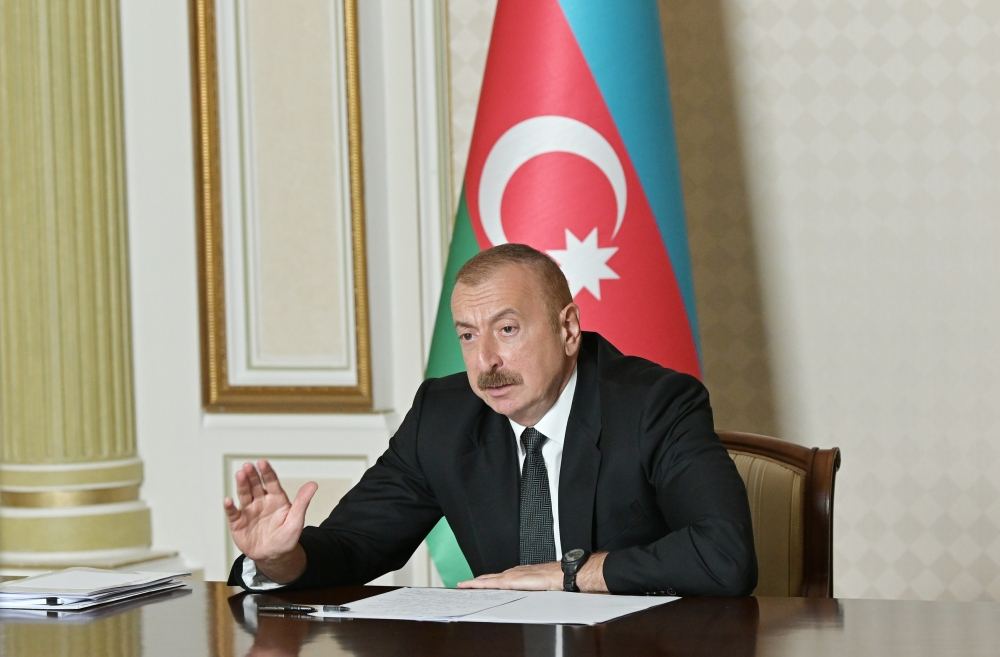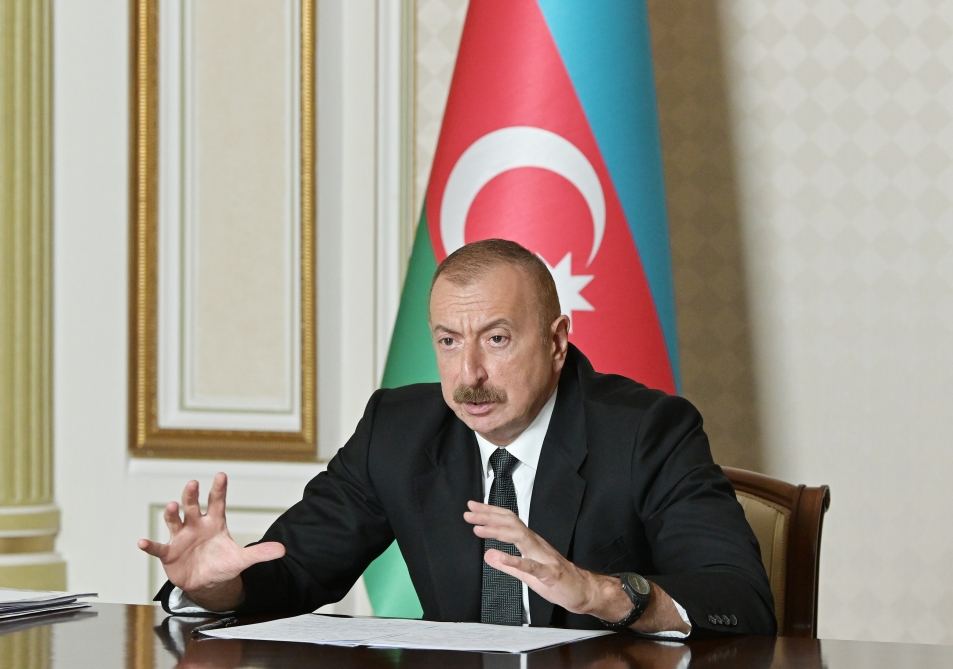BAKU, Azerbaijan, July 23
Trend:
President of the Republic of Azerbaijan Ilham Aliyev has chaired a meeting in a video format dedicated to the water management situation.
The head of state made an opening speech at the meeting.
Opening speech of President of the Republic of Azerbaijan Ilham Aliyev
- Today we will discuss problems in water management and talk about the work to be done. Water projects occupy a special place among infrastructure projects. We are consistently implementing all infrastructure projects in the country. As a result of these projects, our country is developing fast. If we had not implemented these projects, the sustainable development of our country would not have been possible today. Of course, it was necessary to define priorities among infrastructure projects, and when we adopted the first State Program on the socioeconomic development of the regions in 2004, we set these priorities very clearly.
At that time, we had quite serious infrastructure problems. There was a lack of energy in the country. We were facing major problems related to the production of electricity and depended on imports. Of course, first of all, it was necessary to normalize the situation in this area, otherwise there could be no question of any development. The funds invested in the energy sector in recent years and the modernization carried out in this area have allowed us the opportunity not only to provide ourselves with electricity for many years, but also to create export opportunities thanks to additional generation capacities. The geography of these exports is already expanding. Of course, major investment had to be made in this area, and it was. Our energy security today is provided by more than 30 power plants.
Even more work was done in this area recently, as issues of restoring the lost capacity have been resolved. More than 800 megawatts of lost capacity have been restored at the existing plants, and this process continues. So the entire energy sector is being modernized.
Of course, the level of gasification in our country was very low at that time. As a result of the work done, gasification in our country has now reached 96 percent. I can say that this is one of the highest indicators in the world. But if we take into account that our industry and population are growing, the need for natural gas is increasing, our power plants operate only on clean energy resources, natural gas and water, of course, we will continue to pay attention to this sector as a priority.
The transport infrastructure has been largely upgraded. I think it would be unnecessary to list all transport projects because the public has been repeatedly provided with information about this. Suffice it to say that a report of the Davos World Economic Forum has praised the work done in this area. Azerbaijan is ranked 11th in terms of the efficiency of air transport and 12th in the world in terms of the efficiency of railways. Azerbaijan is in 27th place in terms of the quality of highways. In general, according to the state of infrastructure, Azerbaijan ranks 34th in the world.
Of course, these infrastructure projects also include drinking water and land irrigation projects. A lot has also been done in this area in recent years. This sector was not left on the sidelines. I just want to bring a few figures to the attention of the public. In 2004, when the first State Program on the socioeconomic development of the regions was adopted, the provision of drinking water in Azerbaijan was at the level of 40 percent. Today this figure has reached 70 percent. In Baku, only 29 percent of had continuous supply of drinking water. Today this figure has reached about 82 percent. In the regions, the coverage of the population with drinking water was only at 9 percent. Today that figure is 63 percent. This is truly a historic achievement. We have done this first of all for people’s health, for the development of the economy and agriculture. At the same time, these figures indicate that we have not been able to fully achieve what we wanted. Therefore, from now on, drinking water and irrigation projects will be on our agenda as the most important issues. The main goal of today's meeting is to eliminate the mistakes and existing shortcomings in this area in the coming years, so that a single management mechanism is developed and submitted, so that we consistently implement short-term, medium-term and long-term action plans. As a result, the provision of drinking and irrigation water in Azerbaijan should reach 100 percent.
I believe that the work done in relation to irrigation water also deserves approval. If we had not done this, then our situation would be very difficult today. Several projects serve both as drinking and irrigation water projects. The giant water projects implemented in Azerbaijan in recent years have completely changed the situation for the better. Among them, I would like to highlight the Oghuz-Gabala-Baku water pipeline. This pipeline is of great importance. First of all, large volumes of clean drinking water are delivered to the city of Baku. Considering that a significant part of our water resources is formed in foreign countries, the Oghuz-Gabala-Baku water line is a large project based exclusively on a local source. The implementation of this project began, one might say, after we received our first oil revenues. At that time, I said that we need to transform the black gold into human capital, and the Oghuz-Gabala-Baku water pipeline is a clear proof of that because oil revenues began to flow into our country after 2006. At that time, the Baku-Tbilisi-Ceyhan oil pipeline was put into operation. Then, of course, our revenues were at a very low level. However, we channeled them primarily into resolving the problems of internally displaced persons and issues related to water.
Experts are well aware that if we did not have the Oghuz-Gabala-Baku water pipeline today, the problems related to water could deteriorate in the city of Baku.
This is not the only project. I believe that the construction of the Takhtakorpu reservoir is a historic project because the volume of this reservoir is quite large – 270 million cubic meters. At the same time, a new concrete canal was laid from the Takhtakorpu reservoir to the Jeyranbatan reservoir. The special significance of the Takhtakorpu reservoir is that the waters of the Samur River are collected there. They are naturally treated and water from the new reservoir flows into Jeyranbatan. Previously, water from the Samur River entered Jeyranbatan directly through the canal. If we did not have this large water basin, we would not be able to provide Baku with drinking water now. This is obvious. Therefore, a lot of work has been done to implement this project and, in general, to distribute the waters of the Samur River fairly. At the same time, it has significantly expanded the area of irrigated lands in Shabran, Siyazan and Khizi districts. Water is now supplied to the previously non-irrigated lands with an area of almost 30,000 hectares and large-scale agricultural work is currently underway on these lands.
Another major project is the reconstruction of the Jeyranbatan reservoir and the construction of modern treatment plants. When the project was completed, this treatment plant was considered the largest in the world. An even larger facility may have been built somewhere else since that, but this is not the point. The main thing is that it was already possible to supply high-quality water to the city of Baku.
Of course, I should also note the importance of the Shamkirchay reservoir. The Shamkirchay water reservoir plays a special role in the collection and distribution of our water resources today. The capacity of this reservoir is 165 million cubic meters. Several districts of the western zone are using these opportunities and the cultivated areas there are expanding. Thus, Takhtakorpu plays an important role in providing water to the northern zone and Baku, while Shamkirchay to the western.
In parallel, the Goytapa and Tovuzchay water reservoirs were built in the southern zone in recent years too. The capacity of these large water reservoirs created over the past 15 years is 470 million cubic meters. Experts are well aware that this is a very large figure.
As for drinking water projects, they are of particular importance. They are being consistently implemented on my initiative. Drinking water and sewage projects are under way in most of our cities now. This work has not yet been completed only in a few cities, but work is under way. We must analyze both positive and negative experience in this area because, according to my data, in some cases water sources were chosen incorrectly, natural changes, climate changes, including the drought experienced in the last two years and its risks, were not calculated. Therefore, water shortages have been experienced in a number of places where drinking water projects were implemented. Therefore, this issue should be seriously examined. Of course, the figures I have cited indicate that we have achieved great development. But there is still a lot to do.
I have been receiving letters from the ground every day. As a result of the drought and in some cases the indifferent attitude of relevant bodies, very serious problems have emerged. Farmers and entrepreneurs write more. Letters from more than 10 districts are received on a daily basis. These letters are examined in the Presidential Administration and the Cabinet of Ministers. These signals are monitored and issues are resolved promptly. However, we must solve them in a comprehensive manner in order to be ready for an unsightly picture and difficulties caused by natural problems in the future.
Therefore, the issues I have noted unequivocally indicate that the problems of drinking water and land reclamation are not just in the spotlight, but a lot has been done to resolve them. However, the drought that occurred last year showed that we are not ready for such a crisis. Relevant bodies failed to correctly determine what needs to be done in such a crisis. Therefore, we lost time last year. If relevant bodies had worked hard last year, had not blamed each other and taken urgent measures, we would not be faced with these problems now. These problems affect both human health and the development of agriculture because water is life. Human health primarily depends on clean drinking water.
At the same time, water resources have a huge impact on the ecological balance and the development of agriculture. We must develop agriculture using intensive ways, and to do this we need to have sufficient water sources, and this is the case. But if there were no such monstrous losses, we could fully provide ourselves with water. This issue is being studied now. In some cases, losses amount to 40 or 50 percent, which is unacceptable. We are losing water. Thus, it does not reach cultivated areas and houses and, on the contrary, causes damage to lands. The most labor-intensive sectors in our country today are grain and cotton growing. Cotton growing cannot develop without water at all. This sector employs approximately 200,000-300,000 people who support their families. In grain growing farms where there are modern technologies, including modern irrigation systems, we get about 70-80 quintals of wheat from each hectare. This is at the level of developed countries. In fact, this is the highest level in the world. It cannot get any higher than that. Can we achieve this if there is no water?
By applying modern technologies to grain growing, we can grow more on the existing areas, perhaps even on slightly smaller areas, and depend on imports less. Water is life, development and security. Therefore, these issues must not be treated indifferently. I must say quite frankly that this work was left to the mercy of fate and no-one was dealing with it. Each of the relevant bodies was minding its own business and there was no coordination. “AzerSu” and land reclamation agencies became more active only when the state investment program was being discussed, wondering what share of the state budget they would get. In some cases, the projects they proposed were not worthy of any attention at all. I simply saw that their goal was to receive and use public funds. But did anyone enquire about the effectiveness of these projects afterwards? Did anyone analyzed this? No! This is why some of the projects we invested heavily in actually turned out to be ineffective. How can it be that a water source was analyzed incorrectly? Large funds are allocated, pipelines are built and citizens are happy about this. But then they give a thousand reasons to explain why
this and that happened, say that there is not enough water, that it is necessary to look for a new source, that more funds should be allocated to look for a new source. This must be stopped. Therefore, I will regulate all these matters in an organized manner. Instructions have been given to relevant bodies. A mechanism of strict control is needed, primarily control over costs. Otherwise, “AzerSu” and Irrigation and Water Management Open Joint Stock Company send requests saying that they need so much to do something. It later turns out that there is no feasibility study for this. Where did these figures come from? Out of thin air!
There was no strict control over the investment program and over what was ordered and what was provided. How were the funds spent afterwards? This must be stopped. Therefore, in my opening remarks at today's meeting, I am saying what has been done. But we could have achieved more as a result of this work. Unfortunately, this is not the case. In the future, this work should be carried out only in coordination. I am being told that we have never had a water balance. How is this possible? We have our energy balance prepared. Thanks to this, we know what needs to be done during the year, which agency needs how much fuel. Is the President supposed to talk about drawing up the water balance? This should be done by relevant agencies. Our underground and surface water resources have not been estimated. They were last assessed during the Soviet times and haven’t been assessed ever since. Currently, the process of drilling artesian wells is under way. But we need to see where and how they should be drilled and what impact this will have on groundwater sources. We need to choose the right locations. I repeat that these agencies see their main role here in asking for money to drill an artesian well, asking for money to extend a water line, asking for money to do this and that. Okay, we allocate the money, but then what? It often turns out to be ineffective. Cost control is very low.
As I said, I receive over 10 letters every day. I have given instructions to the Presidential Administration and the Cabinet of Ministers. They are examining them and resolve promptly. But this is not their main job. This should be done by relevant bodies. Why are these letters being sent to me? Because when they are sent to relevant agencies, they do not attach importance to them and shrug them off. There are so many facts like this. How much longer should we tolerate this?
Therefore, having fully analyzed the situation, I set up a special commission in April of this year. The commission has been working for three months now, regularly updating me about the work done during this time and existing problems. The head of the commission is Deputy Prime Minister Shahin Mustafayev. The commission consists of ministers and heads of relevant bodies. If all the relevant bodies had correctly structured their work, there would be no need for this commission. How can it be that a commission that has been working for only three months has achieved a more significant and more tangible result in terms of analysis and suggestions than the work done over the past 20 years? This means it is possible. But nobody cared about this and pinned this on each other. And what we get is drought. This problem has existed for two years, it may still be there next year. Climate change is an issue the whole world is discussing. According to some estimates, if prompt measures are not taken, then the process of desertification will accelerate in our country by 2030. Do you want Azerbaijan to turn into a desert? Therefore, this attitude must be stopped. All the officials making mistakes and showing indifference to this issue should be punished.
Shahin Mustafayev will report on the work done and make some suggestions.
President Ilham Aliyev: Your report clearly shows the great damage water shortages have caused to our economy, agricultural development and farmer incomes. Now we are implementing large-scale programs to stimulate farmers and entrepreneurs – subsidies, low-interest loans, equipment, fertilizer and fuel. The state has taken all this upon itself so that farmers can live better. We freed them of all taxes except for the land tax. However, notice how much damage has been done to us only by a lack of water. In grain and cotton growing, productivity should have been higher.
This year we used the replanting experience for the first time. The first information I received was that we would plant corn on 100,000 hectares. Then, due to a lack of water, we reduced its planting to 50,000 hectares but we were unable to plant even 50,000 hectares. For example, if we can plant it on 100,000 hectares, it will be of great benefit to us, our feed base will expand, our dependence on imports will decrease and the currency will not go abroad. Therefore, all these issues should be and are being very seriously analyzed. At the same time, the tasks to be set and the program to be adopted must be comprehensive. We must do everything we can this year. We must do the key work, of course, in order to prepare for the sowing season next year.
Regarding the letters sent to me. I forward these letters to a relevant department of the Presidential Administration and to the Cabinet of Ministers. Zeynal Naghdaliyev, please inform us about how the issues raised in the letters are examined, what measures are taken to resolve them and approximately what percentage of these issues has already been resolved? What steps will be taken afterwards?
President Ilham Aliyev: Do you know what this shows? This shows that there was no state control over this area for many years, including control on the part of the Presidential Administration. After I gave instructions to the Department of State Control Affairs, they began to work and prepared an extended report. Karam Hasanov has not covered all the issues now, because there is no time, but this report shows everything. A commission was set up, started to operate, carried out an analysis for three months and one might say that all the shortcomings were identified. Okay, didn’t anyone see these shortcomings? Why didn’t relevant bodies deal with this issue? They believed that extending a pipe there or concreting a canal here was sufficient. And does work end there? No, it doesn’t! It is necessary to organize work in such a way that farmers and citizens are satisfied. There may be a shortage of water. There are natural causes. It is clear that last year and this year there has been an unprecedented drought in history. However, if we had structured out work correctly, and identified these issues on time, we would have come out of this situation with fewer losses, of course. Therefore, a broad action plan will be prepared after today's meeting, of course. The proposals voiced today, as well as the proposals developed as a result of the analysis carried out by relevant bodies, proposals from the ground must all be taken into account. After all, when adopting the first state program on the socioeconomic development of the regions and subsequent programs, we incorporated the numerous issues based on the information we had received from the ground. What are people worried about? What are the problems in the districts? We developed these programs on the basis of such statements and proposals. It should be done in the same manner this time as well because this program should reflect all the existing problems.
As for the balance of water resources, it is good that this issue was resolved in a short time. Of course, the water balance must be prepared on a regular basis from now on. This will be the main roadmap for us. Without drawing up a water balance, we will not be able to plan our work.
Modern metering equipment must be installed at our main water bodies. They have already been installed at several of them. However, this should have been done a long time ago. How can it be that there is no metering instruments at our main water reservoirs? How much water came in and how much water left? They are still looking in the old-fashioned way, the level on the wall of the reservoir, and then draw conclusions.
President Ilham Aliyev: We also need to use the capabilities of our satellites. I know that “Azerkosmos” is also involved in this work. Observations must be carried out on a regular basis. At the same time, existing problems must be identified by means of the satellite. This work should also be carried out regularly.
There is a great need for the irrigation of cultivated areas using modern technologies, especially if we consider the fact that we have to save water now. Therefore, we must involve foreign specialists in these activities. Let the commission deal with this issue. At the same time, we must also stimulate entrepreneurs. In other words, stimulating steps should be taken so that entrepreneurs apply modern technologies, perhaps through preferential loans or privileges, so that this is done not only by the state. We will resolve the necessary infrastructure issues anyway, but this should motivate entrepreneurs to use state-of-the-art technologies. Here, of course, it is necessary to carry out some awareness raising work, make presentations so that entrepreneurs understand: if they use these technologies, what benefits will be provided by the state and therefore the yield will increase.
I believe that the issue of assessing ground and surface water resources has already been resolved. The lacking funds should be allocated soon. In addition, it is imperative to involve foreign specialists in the inspection of hydraulic facilities.
The process of applying a system of scheduled irrigation of farmlands has begun. I believe that this should be a comprehensive process. Schedules should be applied throughout the country and there should be a strict control. When addressing this issue, it must be consistent with the “Electronic Agriculture” information system, of course. It is necessary to involve farmers in this work, because the distribution of water must be fair. The letters I receive from the ground suggest that in some cases the principle of justice is violated. Those who have opportunities, influence or a relative working in a senior position are provided with water, while other farmers are left without it. Therefore, the scheduling must be fair and the public should be involved in this work. Of course, a control mechanism is required. Central and local executive bodies must work together to do this.
I am told there are illegal tie-ins into water lines in many places and no-one is responsible for this. Firstly, such tie-ins are illegal and should not be allowed. Secondly, I am told that some farms are using water excessively, while others do not get enough of it. Therefore, an effective control mechanism is required here – both visual and electronic. There are currently devices that, for example, immediately signal if the pressure in the pipe drops. Therefore, the most modern systems should be applied here too in order to make this issue electronic and reflect it in a single information center, an information system. Then you will see: if pressure drops in one area or another, this means there are illegal tie-ins. This should definitely be prevented.
All these illegal tie-ins should be eliminated soon. It is necessary to involve local and central executive bodies in this process and, if necessary, law enforcement agencies in order to put an end to the chaos. The worst thing is that no-one is responsible for this. There is no mechanism of punishment for illegal tie-ins, no control mechanism because all agencies believe that this is not their responsibility. This means that if this commission had not been set up, if I had not established it and revealed it, then this would have continued. Therefore, this issue should definitely be resolved soon.
Regarding losses. It is necessary to take comprehensive measures to dramatically reduce losses. Of course, the main source of losses is ground canals, but not only that. Losses are allowed at other stages as well. In some cases, these losses are artificially inflated. It also happens that there are no losses at all, but a volume of water is written off as being lost. I am told that negative phenomena are widespread here as well. Therefore, first of all, we must reduce losses because 40-50 percent of losses is an unacceptable figure. I want to say again that if the losses are eliminated, then we will have enough water sources and resources.
Major funds are being invested in drinking water and land reclamation projects. There are modern technologies today. In addition, there are new technologies to extend the service life of pipes and they should be used. However, these losses seem to be beneficial to someone because where there are losses, there is no record keeping. Anything can be written off as losses. Therefore, the program should have a special direction. It is necessary to draw up a schedule – what rate the losses will be reduced at, the level of reduction each year, but if they do not fall, then the leaders of the agencies responsible for that should be punished. After all, I keep hearing every year: losses, losses. Okay, there are losses but there is also a way to prevent them. Was it really impossible to find this way over the years? It means that someone is interested in these losses. Let everyone draw a conclusion.
Proposals have been voiced to collect water from mountain rivers. I support that. An extensive analysis of the resources available in our mountain rivers has already been carried out. Therefore, issues related to the construction of small water reservoirs and the connection of mountain rivers to our main water lines must be considered. I believe we can do this work in a short period of time. Again, an effective control mechanism is required.
Another issue is related to the assessment of water resources. In making this assessment, it is also necessary to establish whether it is feasible to increase our water resources, whether or not this is possible. There may be places we are not aware of, where there are sources but no work or exploration has been carried out so far. I have just been informed that an assessment of ground and surface water sources was carried out during the Soviet era. Notice how much time has passed. Plus there are new technologies. We may have large water sources somewhere, but we are simply unaware of them.
We have carried out the construction of the Oghuz-Gabala-Baku water pipeline also on the basis of information obtained during the Soviet era. This question arose at the time and suggestions were made. But since we depended on central all-Union funds back then, funds were not allocated and the project was not implemented. However, although there was no project, there was still evidence that this region has large and great sources of clean water. Therefore, when making this assessment, it is imperative to analyze the likelihood of an increase in water resources.
The suggestion has already been made to reconstruct ground canals. It is necessary to draw up a short- and long-term program. As I have already said, we should attract foreign specialists, new technologies and implement pilot projects. Choose several locations for the implementation of pilot projects so that we can start this work on several canals, and then conduct trials within a few months, perhaps a year. If new technologies prove effective, we can use them.
The submitted proposals envisage the reconstruction of 22 canals at the initial stage. The main question is how these canals will be reconstructed. If we achieve this, we will be able to fully provide water for the cultivated area of about 300,000 hectares.
President Ilham Aliyev: We use water in the operation of power plants and, of course, hydroelectric power plants, as well as thermal power plants, rely on water. Without cooling, thermal power plants will not be able to operate. As I have just mentioned, we have done a lot of work lately in connection with the rehabilitation and upgrade of power plants, restored the lost capacity somewhere at the level of 800 megawatts. Recently, the Mingachevir thermal power plant was opened after reconstruction. The station generates 2,400 megawatts of electricity. Of course, this area should use water for cooling purposes economically. At the same time, the level of the Caspian Sea has decreased. This, first of all, has a negative impact on the Sumgayit thermal power plant. This is a station with a capacity of 525 megawatts. It is not ruled out that problems may arise with the cooling of the power plants “Shimal-1” and “Shimal-2”. There, too, the total generation capacity is 800 megawatts. Let the chairman of “AzerEnergy” provide information now. An overpass is under construction now to cool the Sumgayit power plant. How are things going with this construction and when will it be completed? In general, what preventive measures are being taken in connection with the decrease in the level of the Caspian Sea, so that we can insure ourselves against this situation.
President Ilham Aliyev: The change in the water level in the Caspian Sea is due to natural reasons. As far as I know, even scientists are still unable to determine why the water recedes for a while and then its level goes back up. This is periodic in nature, so we must be prepared for any situation. In recent years, the level of the Caspian Sea has been decreasing every year, so all the necessary measures are being taken. An overpass will be put into operation in the coming months. As for “Shimal-1” and “Shimal-2”, the drop in the water level has not yet had any particular effect. But if this process continues into the future, we must be prepared. In general, in solving the problems of water management, of course, the energy sector should also be active and there should be full coordination. Based on this seasonal nature, we must engage our generating capacities. We now have about 1,000 megawatts of generating capacity in excess of the demand, so we can either shut down any plant or reduce its operating efficiency so that these problems can be resolved in full coordination.
President Ilham Aliyev: Do try to resolve this issue. As long as water is transported by trucks, you should provide me with accurate information as to whether this suits the citizens or not? If it doesn’t, then we need to find additional opportunities so that trucks can deliver water to people in the right quantities.
There is another issue of concern. I am talking about the state of the modular wastewater treatment plants in the villages along the rivers. I am informed from the ground that sometimes these installations do not work. These installations were once built by the Ministry of Ecology and Natural Resources. If I am not mistaken, somewhere around 400 or more of these installations have been built. But afterwards, according to some information, as a result of mistakes made during their operation, as well as a lack of control, these installations either failed or lost their quality. In other words, it is necessary to conduct a very serious analysis on this issue and report to me. Minister of Ecology and Natural Resources, what can you say about this issue?
President Ilham Aliyev: The commission will consider this issue as well. This is exactly why the commission was set up to consider this and all other issues.
As a result of the meeting, an order of the President should be prepared. It should cover all the instructions. At the same time, a program should already be prepared for signing. I believe that along with relevant bodies, representatives of the public should also participate in all this work. The commission needs to engage members of the public in its work. First of all, an active role in these matters should be played by scientists. Scientists must definitely participate in the assessment of water resources, in the assessment of their possible increase and all other work. You should definitely involve experts in the field of ecology in this work. We must use water in a way that does not negatively affect the ecological balance. After all, we know from history that some countries have implemented major water projects, but sources and water resources were analyzed incorrectly. Therefore, while this had a good effect on irrigation, it exacerbated the environmental situation. Therefore, it is imperative to involve environmental experts. You should also engage nongovernmental organizations. Representatives of civil society should also be active in this work. They will pay attention to issues you may not notice. Engage media representatives as well. I think it is necessary to hold a broad press conference. In general, all government agencies should work in close contact with the media and regularly report on the work done.
This meeting of ours is some kind of a report to the public. At the same time, people should know what we are planning to do. We expect proposals from them too, because if we hold such meetings in a closed manner, no-one will know and there will be no proposals from the ground. Therefore, this meeting is open to the public. I believe that proposals from the ground will certainly help us in our work.
Of course, all this work requires a lot of money. Therefore, the government and relevant bodies, the Ministry of Finance, the Ministry of Economy and other bodies, should carefully consider the cost estimate. We should not allow for costs to be artificially inflated. All planned projects should be implemented on the basis of an open tender because sometimes corporate interests prevail. It happens that one or several companies win all the tenders. Of course, there are projects that can only be implemented by companies that have experience and have participated in large projects. And this is only natural. But there will be small and medium-sized projects in this area, contracts that do not require high professionalism and qualification. Therefore, local entrepreneurs should also be prepared. We will continue to implement truly large infrastructure projects. Therefore, it is necessary to ensure public control. There must be serious state control over estimates, cost estimates.
Of course, in order to effectively continue all this work, it is necessary to develop a single management mechanism. I am giving this instruction as well. Please prepare it too, so that further work is carried out only in coordination – the commission and relevant bodies. Today we have four bodies operating in the water management sector – “AzerSu”, the Irrigation and Water Management Joint Stock Company, the Ministry of Emergency Situations and the Ministry of Ecology and Natural Resources. Therefore, these bodies, as well as the general public, scientists, environmentalists, the Presidential Administration and the Cabinet of Ministers must exercise overall management and control, so that all this work is carried out in a planned manner and so that we can resolve the problems related to our water security in the near future – just as we have resolved the issues of energy security and transport security. We are currently approaching solution to the issue of food security. Water security issues also need to be addressed. Thank you!

